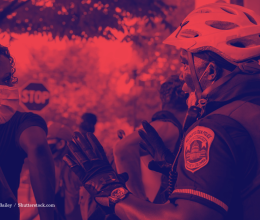In July 2020, the D.C. Council enacted legislation requiring the Mayor to "publicly release the names and [body-worn camera] recordings of all officers who committed the officer-involved death or serious use of force” “[w]ithin 5 business days after an officer-involved death or the serious use of force.”
The D.C. Fraternal Order of Police (FOP) sued to block that legislation, claiming that it violated the separation of powers (arguing that only the Mayor has the power to supervise the police) and infringed the substantive due process privacy rights of officers.
In July 2021, the Superior Court dismissed the case on the grounds that the FOP didn’t have standing, and that the legislation did not violate the separation of powers or infringe the privacy rights of officers. We had filed an amicus brief in the Superior Court, together with the Lawyers' Committee for Civil Rights Under Law, the DC Public Defender Service, the Washington Lawyers' Committee for Civil Rights and Urban Affairs, and Law4BlackLives DC.
The FOP appealed. We again filed an amicus brief, with the Lawyers' Committee for Civil Rights Under Law, the DC Public Defender Service, and the Washington Lawyers' Committee for Civil Rights and Urban Affairs. The case was argued last October.
In March 2023, the D.C. Court of Appeals affirmed the dismissal of the case. It held that the FOP had standing on behalf of its members (we did not address that issue in our amicus brief), but that the FOP did not state a claim on which relief could be granted, as we had argued.
The court explained that the Mayor, as head of the Executive Branch, does not have exclusive authority to direct the activities of executive agencies such as the MPD. Rather, “the policy decision the Temporary Act represents — a balancing of the goals of public accountability and transparency on the one hand, and the (relative) ease of investigation of use-of-force incidents, on the other — ‘does not implicate separation-of-powers concerns; it merely challenges the wisdom of a legitimate policy judgment made by’ the legislature.” (quoting Touby v. United States, 500 U.S. 160, 168 (1991)).
The court also rejected the FOP argument that the law infringed the rights of police officers, explaining, "We are not aware that any court has ever held that police officers have a fundamental right to the privacy of information about their involvement—while on duty and while in contact with the public they serve—in a shooting or other serious use of force.” Giving us a shout-out, the court “agree[d] with amici that ‘[t]he right to decide how to treat information about public police activities belongs to the government and is not a right belonging to individual officers,’ much less a fundamental right of FOP members.”

